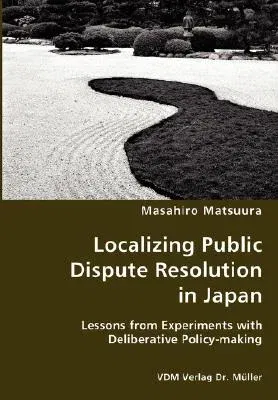Masahiro Matsuura
(Author)Localizing Public Dispute Resolution in JapanPaperback, 27 February 2008

Qty
1
Turbo
Ships in 2 - 3 days
In Stock
Free Delivery
Cash on Delivery
15 Days
Free Returns
Secure Checkout
Print Length
208 pages
Language
English
Publisher
VDM Verlag Dr. Mueller E.K.
Date Published
27 Feb 2008
ISBN-10
383643590X
ISBN-13
9783836435901
Description
Product Details
Author:
Book Format:
Paperback
Country of Origin:
US
Date Published:
27 February 2008
Dimensions:
24.41 x
16.99 x
1.12 cm
ISBN-10:
383643590X
ISBN-13:
9783836435901
Language:
English
Location:
Saarbrucken
Pages:
208
Publisher:
Weight:
340.19 gm

